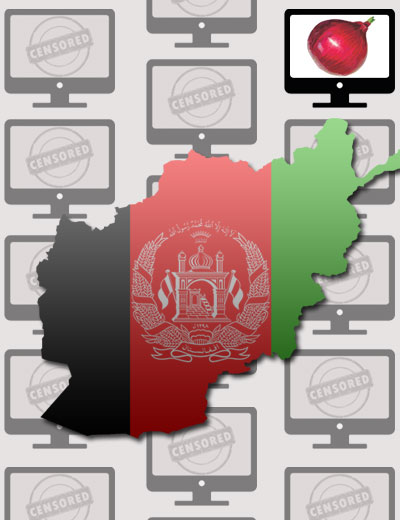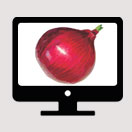
Political Activism, Onion-Style: The Afghan Onion
Political satire is a form of commentary and critique which is protected to some degree in most of the Western world. In nations with fewer protections for the media, however, such commentary is much riskier. Afghanistan is one such nation. While its media laws are more liberal than those of many surrounding countries, the Afghan government has an uneasy relationship with public criticism and maintains tight control over state-run media outlets. Independent media is growing rapidly in Afghanistan, however, including a nascent Internet community that is becoming increasingly bold in its commentary about the government. The Afghan Onion, a satire site, is a recent addition to this community.
There is risk in publicly critiquing the state: the Afghan National Security Council recently rounded up writers suspected of running the satirical Facebook page Kabul Taxi. But the writers behind the Afghan Onion believe the payoff is worth the risk. In our exclusive interview with them, we asked them about the current media landscape in Afghanistan and what they seek to accomplish with their site. (In order to protect themselves from retaliation, the writers of the Afghan Onion have chosen to remain anonymous.)
Check Please!: What is, in your estimate, the current state of the media and journalism in Afghanistan? Has it changed much over the past few years?
Afghan Onion: Media is one such example where everyone can agree that Afghanistan has made significant progress. It’s freer than in Pakistan and has the potential to become on par with other regional nations such as India. Access to media remains a big challenge in rural areas in particular. But those who do have access are more engaged in political debates and watch prime time news with interest. There have been incidents of concern to curtail some media practices but given the power of citizen journalism and news going viral media always wins.
CP!: The Afghan Onion publishes in English. According to some estimates, only 8% of Afghans speak English, and approximately 10% have Internet access. Who is your intended audience?
AO: We started off in English on purpose. Our prime audience is Afghan elites, politicians, and foreigners. The general consensus is that foreigners control the narrative pertaining to Afghan affairs and most of the writing happens to be in English. We decided to challenge that norm and in the process challenge the misperceptions, sweeping generalizations, and stereotypes that many foreigners make in their writings. Also, we wanted to be active in all three languages, Pashto, Dari and English but due to lack of resources we can only manage to do English at this point.
CP!: The Constitution of Afghanistan guarantees freedom of expression, provided that it doesn’t run contrary to the beliefs and provisions of Islam. However the Media Law bans "slanderous or insulting materials" and "false information that might disrupt public opinion." Do you believe that your work is protected speech under the Constitution, or that the Media Law should be amended to permit independent critiques such as yours?
AO: Afghanistan is coming of age, people are more receptive to humor now than before, and politicians in particular are not fond of being mocked. Media law remains on paper like other laws, but citizen journalism knows no rules, and is bound to keeping its audience entertained with fresh materials. We are a satire, and employ a tongue-in-cheek approach to present prevalent views in an entertaining way. We don't spread slanderous or insulting materials but consider it our right to discuss socio-political affairs in open milieu and we do believe that our work is protected speech under the constitution. We don’t ignore Media Law by any means, but the supreme law of the land i.e., the constitution guarantees freedom of speech.
CP!: Do you censor yourselves to any degree – i.e. are there topics that you consider off limits?
AO: Yes. Our prime target is politicians and influential individuals in Afghanistan. We also target foreigners, journalists, and media. But we keep their families off-limit. We understand the cultural and religious sensitivities of Afghanistan and try our best not to be offensive.
CP!: Could you tell us about your opinion on the difference that satire plays in relation to journalism in countries such as Afghanistan where there is a risk of state censorship (such as the recent takedown of the satirical Kabul Taxi Facebook page) versus countries such as the US where there isn’t much risk?
AO: Satire is not a new phenomenon in Afghanistan. It existed but was limited to social gatherings. With advances in media people are realizing that other forms of media also exist and they are increasingly taking interest in humor. We decided to bring satire out of social settings to online community which other sites such as Kabul Taxi have done so well too. There is always a risk of running over someone's foot but we tend to take calculated risk to make our point across. Afghanistan has a history of censorship and even mainstream media has been subject to abuse but given that our stories are mainly in English, and elites are accustomed to satire they understand our line of business better, and stop short of reacting.
CP!: Did any of you have any affiliation with the Kabul Taxi?
AO: No we did not.
CP!:Is there a specific catalyst in any of your lives that has inspired you to express yourselves through satire?
AO: We are hyphenated-Afghans and have lived abroad for most of our lives so obviously western media influences us. People in West think Afghanistan is a hellhole which has inspired us to present a rather real version of Afghanistan to the world i.e., full of humor, fun, and entertainment. Yes insecurity is widespread and political wrangling are just like any other country but Afghanistan lives on and people adjust, so we try to demonstrate the daily chaos in a way that shows that Afghans are just like other people.
CP!: Are there specific writers or performers who have influenced your approach to satire or inspired your choice to work in this medium?
AO: Late night and political satire shows such as Jon Stewart’s The Daily Show and The Colbert Report have played significant part in giving us a platform. The Onion gives us impetus for our stories.
CP!: Currently your site focuses exclusively on political issues. Do you see the Afghan Onion evolving to cover a broader range of topics down the road, or do you see the essential mission of the site as political in focus?
AO: At the moment we are only focusing on socio-political aspects to build an audience and remain impartial. We tried a week of social issues but didn’t get much traction which indicates that our audience craves political humor. Given our limited resources we cannot think beyond this narrow scope at the moment but provided that we are well liked and supported we are open to expanding in future.
CP!: Do you consider yourselves political activists?
AO: Yes. We’d like to be perceived as political activists. We have taken vows to keep politicians on their toes and hold them accountable in our lede.
CP!: What do you think of US politicians such as Donald Trump? Do you have opinions about the American election process in general?
AO: US politics is glamorous. There is the silly election season where candidates such as Donald Trump, Sarah Palin, Ted Cruz, et al exhaust all the stereotypes to garner favorable polls and speed ahead in the primaries. Those candidates do well initially but ultimately fall short of receiving the required number of votes. There are genuine exceptions of course. In our opinion Trump will continue to make news flash but he will stop short of becoming the GOP candidate. We follow American politics very closely.
CP!: Your site is registered in the United States, presumably to make it more difficult for Afghan government officials to interfere with the website. Is there a future for Afghan Internet sites in Pashto or Dari?
AO: We do not want to be targeted so of course registered the site in the US. Depending on our status we eventually want to move towards a different interface to make it more interactive and visually appealing. The majority of our population speaks local languages and they are making inroads in Pashto and Dari websites, so yes the future is bright.
CP!: Are there subjects you wish more US or European satire sites would cover, or possibly cover differently?
AO: Western satire also becomes victim to sweeping generalizations and they too continue to spread stereotypes (inadvertently) for lack of proper research. When Afghanistan is mentioned it never receives the same amount of attention, they jump on the same clichéd bandwagon. Reality escapes those shows so perhaps before penning an article or doing a story on foreign countries it's best to check with local editors if that's the reality they are presenting.




